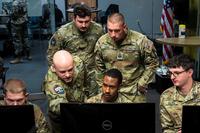The coronavirus, domestic divisions and fears that political violence might erupt topped the list of Americans' greatest concerns facing the nation, according to the latest survey from the Ronald Reagan Institute.
The Reagan National Defense Survey, conducted last month, found a decline in Americans' overall attitudes almost across the board -- including declining trust and confidence in the military. But it said such results were unsurprising.
"With all that has happened in the last year, it is understandable that Americans are experiencing a sense of pessimism," the institute said in a summary of the survey results.
Read Next: Seoul Agrees to Pay More for Hosting American Troops in 2021
The survey found significant concerns about threats emanating from within the United States, with 61% of Americans believing they are equal to or greater than external threats. Most members of both parties hold those concerns, with 55% of Republicans and 69% of Democrats feeling that way.
The survey came after a year of national trauma, including more than half a million deaths due to the pandemic, a nationwide reckoning with race and police violence and the protests that followed, a bitter presidential election, and growing concerns about extremism in America, culminating in the violent riot at the U.S. Capitol on Jan. 6.
Amid it all, the public's trust and confidence in the military and other institutions continues to slide. In 2018, 70% of Americans said they had a great deal of trust and confidence in the military, but that has declined to 56%.
The population group with the greatest concerns about the military is people under 30, only 38% of whom have a great deal of confidence in it. That is a drop of 15 percentage points from 2018.
Just 44% of Black voters, 48% of Democrats and 51% of women also had a great deal of confidence in the military.
Even the number of Republicans with great confidence in the military -- although still very high at 70% -- recorded a 17-point decline since 2018.
Even with that drop, the military is still by far the most trusted institution in America, the survey found. And the institute said it found large majorities of Americans still feel the military should play a role in many domestic emergencies, including natural disaster response and pandemic control. However, fewer Americans feel the military should be used to control violent protests, respond to domestic terrorism or respond to insurrection by U.S. citizens.
The only other institution with a comparable decline in trust was law enforcement, which saw an 11 percentage point drop over that period. But law enforcement remained the second-most trusted institution, at 39%.
Other institutions, such as the presidency, Supreme Court, public schools, news media and Congress, either saw trust levels remain steady or go up since 2018.
And the public's view of which problems are most pressing has changed considerably over the last two years.
When asked an open-ended question about what they consider the most important problem facing the country to be, 29% of respondents identified the coronavirus pandemic, more than any other problem.
Politics and partisanship was the second-most common response, with 17% calling it the most important problem. That is down considerably from previous surveys in which it topped the list, at 22% in November 2018 and 25% in October 2019.
The survey found a marked increase in concerns about the economy and jobs, a year after the pandemic battered both. Last month, 15% of respondents called the economy and job market the most important problem, nearly twice the 8% who felt that way in 2018.
And concerns about immigration and health care both fell sharply to 3% each. In 2018, 12% felt immigration was the nation's most important problem; 9% thought it was health care.
Systemic racism appeared on the list for the first time, with 6% of respondents calling it the nation's top problem.
But while 1% felt domestic terrorism is the top problem this year, overall terrorism didn't even register.
There are signs of optimism for the future. The percentage of Americans who feel the nation is generally headed in the right direction has steadily increased, from 37% in November 2018 to 42% last month. Similarly, the percentage of people who feel the nation is headed in the wrong direction dropped from 54% to 51% over that time period.
And even though confidence in the military is declining, the Reagan Institute says Americans are not making a shift to isolation. The survey found that 51% of Americans think the United States should take the lead on international events and be more engaged around the world, which is roughly what it was in 2019. And the number of people who feel the U.S. should be less engaged and more reactive fell 6 percentage points to 27%.
The survey also found broad support for an overseas military presence, with 63% saying the U.S. should maintain its bases abroad to deter attacks and respond quickly when needed. This also has strong bipartisan support from more than 60% of both Republicans and Democrats.
However, there is less support among young people, with 48% of those under 30 supporting overseas bases.
Sixty percent of Americans have a favorable view of NATO, the survey found. But a majority felt NATO allies need to do more to share the burdens of defense, with 48% of respondents feeling the same about Indo-Pacific allies.
The institute said the findings show "President Reagan's legacy lives on" among many in the public who share his view that America needs to take a leading role among nations.
"We see that there's strong support for a Reaganesque outlook, in terms of how President Reagan viewed the world and America's role in the world," Reagan Institute Director Roger Zakheim said in a briefing with reporters. "The belief in peace through strength, and commitment to America as a beacon of freedom in the world, really seem to be something that this entire poll shows that not just a plurality, but a majority of Americans, continue to believe is important."
Half of Americans think that troop levels in Afghanistan should be increased or left at current levels, the survey found, and 39% want to see more troops brought home. Support for troop declines in Afghanistan was strongest among Republicans, with 47% saying they wanted to see levels decrease. About 33% of Democrats and 36% of independents felt the same about troop levels.
But Americans are largely worried that the U.S. is falling behind on technologies vital to national security, while China is making significant strides. Three in four Americans are worried about China's development of artificial intelligence capabilities, and 55% of Americans feel the U.S. relies on non-allies too heavily for key national security materials.
Americans are most likely to be concerned about China's human rights violations, with technology theft coming in second.
A wide swathe of the population -- 88% -- is greatly concerned about cyberattacks on both personal computers and accounts, as well as government computers and grids, the survey found.
And when it comes to Russian threats, Americans are more likely to report being concerned about its cyberattacks than other forms of malign activity, including election interference. In all, 82% of Americans have some degree of concern about Russian cyberattacks.
-- Stephen Losey can be reached at stephen.losey@military.com. Follow him on Twitter @StephenLosey.
Related: Extremism 'Has Reared Its Head' in Air Force Special Operations, General Says












